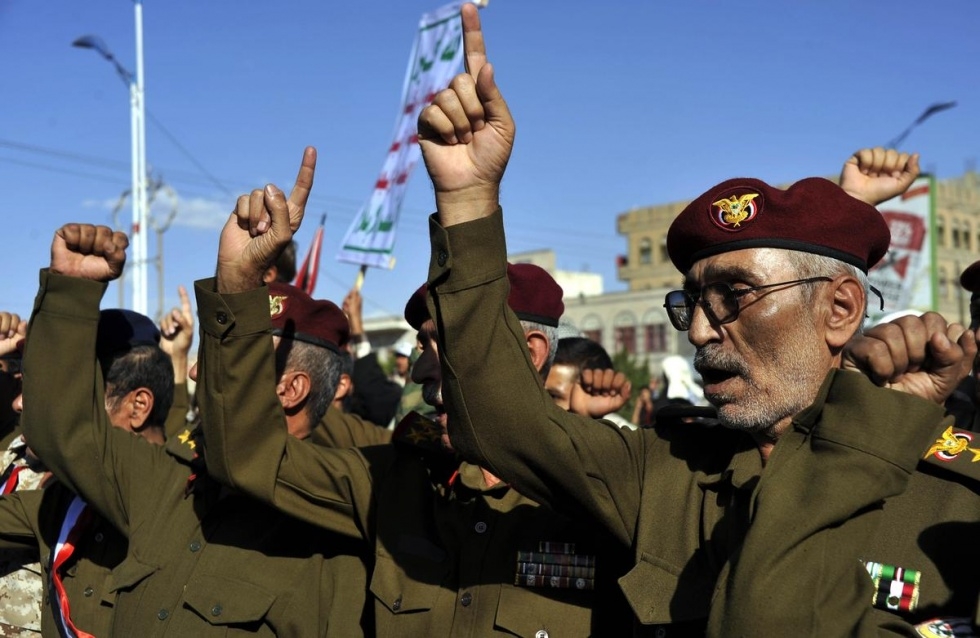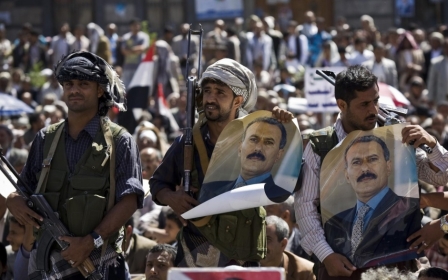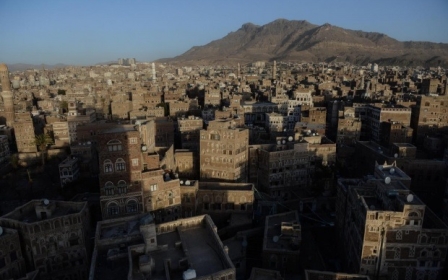Yemen's Houthis may be overreaching

Recent events indicate that the situation in Yemen is spiralling out of the control of Houthi forces, who have captured swathes of the country - including its capital - since last year. It seems increasingly unlikely that they will be able to deliver on promises of security and stability - not to mention political, economic and social issues - when their own actions are exacerbating chaos and causing a growing backlash against them.
The escape in February of President Abd-Rabbuh Mansour Hadi from house arrest imposed the previous month poses a potentially major headache for the Houthis. Defying their accusation that he had "lost his legitimacy to act as president," Hadi has withdrawn his resignation, insists he is still Yemen's "legitimate" leader, and declared that all measures taken by the Houthis since they seized Sanaa in September are "null and illegitimate".
Since his escape from Sanaa to Aden, Hadi has been successfully courting internal and external support against the Houthis, in the absence of another figure capable of challenging them. In the days following his escape, he met with the governors of half the country's provinces - north and south - among them the geographically largest.
He has also met with the secretary-general of the Gulf Cooperation Council, as well as Gulf ambassadors, who have relocated from Sanaa to Aden to be closer to Hadi. He has received statements of support from the GCC - whose members provide an economic lifeline for Yemen - the 57-member Organisation of Islamic Cooperation, the 22-member Arab League, and the UN secretary-general, among others.
Hadi's actions and statements suggest the very real possibility that Yemen will, like Libya, be run by two rival governments, one of them - Hadi's - recognised by the international community, the other increasingly a pariah.
The Houthis have themselves to blame for their predicament. Their advances up to and including the capture of Sanaa were met with little resistance, largely because their grievances - including high fuel prices and widespread corruption - are shared by other Yemenis. However, the Houthis have systematically alienated themselves from the general public, as well as from other political factions, with whom they claim to want to work.
In defiance of a blanket ban, protests against the Houthis have increased in frequency and size since their takeover of the capital, and more so since putting Hadi under house arrest. Demonstrations in January and February have reportedly been the largest yet. Public anger has increased over the Houthis' refusal to leave Sanaa, their territorial expansion, and their beatings and abductions of protesters and journalists.
"Harrowing testimony" reveals how Houthis "are torturing protesters in a bid to dissuade dissent," Amnesty International said in a report published in February. They have "stooped to a dangerous new level of intimidation and violence to strike fear into anyone protesting their rule."
While claiming to seek consensus, the Houthis have in effect been ruling by diktat. They have dissolved parliament, stormed state institutions, put ministers under house arrest, threatened to charge those who are "uncooperative" with treason, reneged on agreements - including government-formation and withdrawing from Sanaa - and used threats and ultimatums against political parties and figures.
This week, the Houthis kidnapped al-Islah party's representative in national talks. Given their increasingly authoritarian tactics, it is little wonder that other parties are turning their backs. For example, a Houthi-led conference earlier in February, aimed at reaching a political settlement, was almost unanimously boycotted.
The result of all this is that provinces are refusing to take military commands from Sanaa, and the Houthis are engaged in increasingly fierce fighting against forces loyal to Hadi, powerful Yemeni tribes and a galvanised al-Qaeda, which had previously been a target of the tribes until the Houthis gave them common cause.
Al-Qaeda has played on sectarian sentiment, accusing the Shiite, Iran-backed Houthis of "completing the Persian project in Yemen." Its call for Sunnis to take up arms raises the spectre of foreign participation. Since al-Qaeda has supported the Islamic State from the start of the US-led military campaign in Iraq and Syria - the jihadist groups had previously fought each other in Syria - IS may return the favour in Yemen.
As well as widespread domestic opposition to Iranian meddling in the form of support for the Houthis, their public standing has also been greatly hurt by their alliance with former President Ali Abdullah Saleh. Although denied by Saleh and the Houthis despite growing evidence, UN investigators this week said the former president "colluded with the Houthis in what resulted in a coup d'état".
The investigators also suspect Saleh of corruptly amassing as much as $60 billion, equivalent to Yemen's annual GDP, during his rule. This highlights the irony of the Houthis claiming to represent the Yemeni people while allied to a widely reviled dictator who was ousted by a popular revolution.
The investigators' findings prompted the UN Security Council to vote unanimously to extend sanctions on Saleh and two Houthi leaders - including an asset freeze and global travel ban - for another year. Earlier in February, the council had demanded that the Houthis withdraw from government institutions.
Hadi enjoys regional and international backing, and there are unconfirmed reports of Gulf states supporting Sunni tribes. Meanwhile, long-term Iranian support for the Houthis will be a military strain given Tehran's deepening involvement in Iraq and Syria, and an economic strain given international sanctions and plummeting oil prices.
The ability of a minority community to consolidate its gains, let alone expand and govern, will be increasingly difficult as public unrest grows and more people take up arms. In short, the Houthis may be overreaching. The question is whether they will realise this and take a more consensual and conciliatory approach, or whether they will continue their crackdown in an all-or-nothing game. The latter approach could be their undoing.
- Sharif Nashashibi is an award-winning journalist and analyst on Arab affairs. He is a regular contributor to Al Arabiya News, Al Jazeera English, The National, and The Middle East magazine. In 2008, he received an award from the International Media Council "for both facilitating and producing consistently balanced reporting" on the Middle East.
The views expressed in this article belong to the author and do not necessarily reflect the editorial policy of Middle East Eye.
Photo: Houthis march and chant slogans during a protest at the Sittin street in Sanaa on 20 February (AA)
Middle East Eye propose une couverture et une analyse indépendantes et incomparables du Moyen-Orient, de l’Afrique du Nord et d’autres régions du monde. Pour en savoir plus sur la reprise de ce contenu et les frais qui s’appliquent, veuillez remplir ce formulaire [en anglais]. Pour en savoir plus sur MEE, cliquez ici [en anglais].





